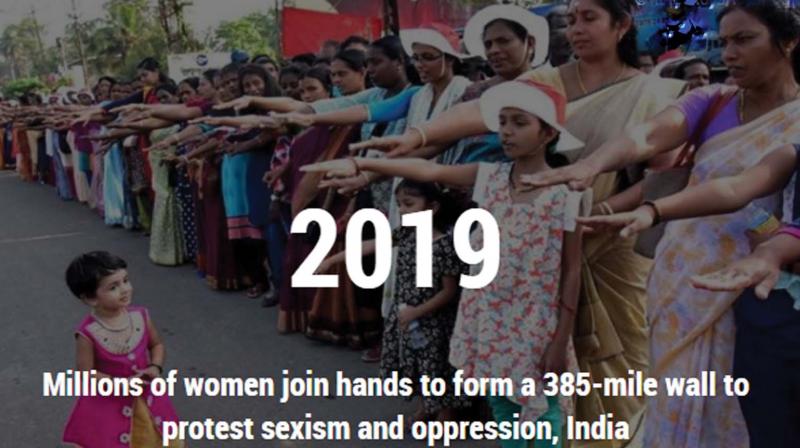UN report hails women’s wall
The report says vast numbers of women around the world are not empowered to make fundamental decisions about their own bodies.

Alappuzha: A UN agency has hailed the 'women's wall' organised by the LDF government on January 1 as a form of protest against sexism and oppression in India.
The United Nations Population Fund's (UNFPA) 'State of world population report 2019' published on April 10 raises a question in the introduction: "Can we do better for women and girls today? If history is a guide, the answer is yes. What are some of the obstacles still standing in the way of women reaching their full potential in life?" it asks and goes on to give some findings.
The report's cover features a picture of the wall at Kayamkulam town taken by Babus Panachamood, a freelance photographer hailing from Mavelikara. It shows an elated kid looking at the elders who take part in the wall, with the caption: 'Millions of women join hands to form a 385-mile wall to protest sexism and oppression, India.'
The wall was organised for gender equality in the backdrop of the protests against the Supreme Court verdict allowing women of all age groups to enter Sabarimala temple.
This is for the first time since 1969 when UNFPA (United Nations Fund for Population Activities) was established that an Indian movement has been featured on the cover page of the report which appeared online and in print in English, French, Spanish, Arabic and Russian.
The report says vast numbers of women around the world are not empowered to make fundamental decisions about their own bodies. However, reproductive rights and choices have become a reality for more women than ever.
The report publishes data on women's ability to make decisions over three key areas: sexual intercourse with their partner, contraception use and health care.
Across the 51 countries where this information is available, only 57 per cent of women who are married or in a relationship are able to make their own choices over all three areas. Women's sexual and reproductive autonomy was greatest in the Philippines and Ukraine, where 81 per cent of women are empowered to make these decisions for themselves, it says.
Dr. Natalia Kanem, executive director, UNFPA, said that we have a long way to go before all women and girls have the power and the means to govern their own bodies and make informed decisions about their sexual and reproductive health.

